The Checker Maven
A Great Checker Resource: Google Books

In recent years, checker books have been hard to come by and often expensive. Publication of new checker books has slowed to a trickle; and while most if not all of the new books are very fine indeed, they are often sold in limited quantities through private sources. It all makes it difficult for the new checkerist looking for study material, the collector looking to broaden his collection, or the experienced player looking to expand his horizons even further.
The Checker Maven has reproduced a number of checker works, both old and new, in newly typeset editions; these have met with a generally enthusiastic reception. But as a small publisher there's a limit to how much we can produce, and it's never as much as we or the checker-playing public would wish.
Enter Google Books (books.google.com), which has as its goal the colossal task of digitizing the world's books, both new and old. An incredible and growing selection is available on-line, and checker books have not been neglected.
Go to the site and search for "checkers" or "draughts" and you'll see what we mean. Dozens of books are listed. While a good part of the collection just shows the book cover or a brief extract, there are numerous books listed as free Google ebooks, and these are yours for the taking. The free books tend to be older classics, but what better way to build or expand a collection of quality checker literature?
There are a few limitations. The books are PDF images and are not electronically searchable; some of the scans are imperfect, and of course they look like what they are: images of the pages of old books. But trust us, you'll want to download many of these. They can easily be printed and used in hard-copy, or simplest of all, just read on the computer.
In today's column we'd like to feature a game from one of the real finds on the site, the match book from the 1887-8 contest between Charles Barker of America and James Smith of Scotland. If you don't have this book in your collection, by all means get it for free from Google Books.
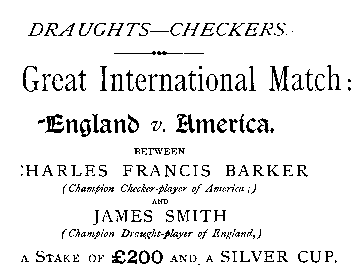
The match was won in a convincing fashion by the American champion Barker. Here is the run-up to the critical position in game four, in which Barker drew first blood.
| 1. | 12-16 | 24-20 |
| 2. | 8-12 | 28-24 |
| 3. | 3-8 | 21-17 |
| 4. | 16-19 | 24x15 |
| 5. | 10x19 | 23x16 |
| 6. | 12x19 | 17-14 |
| 7. | 9x18 | 22x15 |
| 8. | 11x18 | 26-22 |
| 9. | 7-11 | 22x15 |
| 10. | 11x18 | 20-16 |
| 11. | 8-12 | 16-11 |
| 12. | 19-24 | 27x20 |
| 13. | 6-10 | 30-26---A |
Forms diagram.
A---Definitely loses.
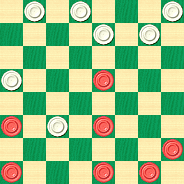
BLACK
Black to Play and Win
B:W32,31,29,26,25,20,11:B18,12,10,5,4,2,1.
Can you correct the losing move? Can you find the winning line of play and book the win? Or will the page turn on you? Find the answers and then click on Read More to scan the solution.![]()
Alex Retains His Title
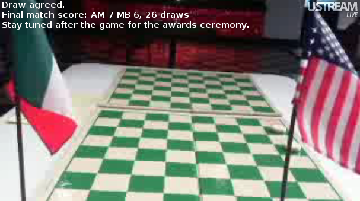
Alex Moiseyev retained his 3-move World Championship title with a narrow win over Italian challenger Michele Borghetti in a match characterized by sportsmanship, great play, and much excitement. The final score was 7-6 with 27 draws.
Links to full details can be found on the American Checker Federation website (linked in the left-hand column). We are all grateful to John Acker for streaming the entire match live over the internet, providing hours of checker entertainment to many fans around the world.![]()
Deans, Pearson, and Quinlan: Laying Down the Law in Checkers

Deans, Pearson, and Quinlan: It sounds more like the trio of lawyers shown above than a trio of checkerists credited with thematically related studies, but checkerists they were. We really don't know whether one or more of them might have been lawyers during their time in the mid-to-late 1800s; we suppose it's possible, but we didn't come up with any further information.
We can confidently say, however, that the three positions diagrammed below are eminently practical and, as the latest entries in our Checker School series, well worth your time to master. All positions are shown with White at the top for ease in comparison.
E. DEANS
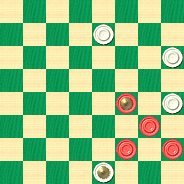
BLACK
White to Play and Draw
W:W26,21,13,K2:BK14,9,6,5.
WHITE
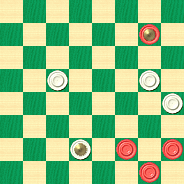
BLACK
Black to Play and Win
B:W19,17,13,K7:BK25,6,5,1.
WHITE

BLACK
Black to Play and Win
B:W15,13,K7:BK14,9,6,1.
These studies "lay down the law," so to speak, for endings of this type. Do your best to find the right moves--- legal moves, of course--- to make your case, then click on Read More for the definitive judgments, including sample games, detailed notes, and a supplementary problem.![]()
World Championship Streaming Live

Thanks to the fantastic work of John Acker, the current 3-move World Championship match between defending champion Alex Moiseyev of the United States, and challenger Michele Borghetti of Italy, is being streamed live from Cleveland, Ohio. Click on the ACF link on the left side of the page for further information. This is an event that is absolutely not to be missed!![]()
Frank Dunne's Shot

In our ongoing series taken from Willie Ryan's Tricks Traps & Shots of the Checkerboard, we've from time to time found new wrinkles via computer analysis, as we have with today's offering. Willie of course got it right (which happens at least 99% of the time), but there is an interesting line of play that the computer turned up and that Willie apparently didn't examine. Let's have a look as Willie describes the problem.
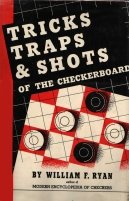
"The name of Frank Dunne, famed English master of five decades ago---1, holds an illustrious place in the archives of checker literature. His writings on the game were of the highest order, and he made many outstanding contributions to the silent art. Here we record the ever useful Dunne Shot which arises in play from several different openings.
| 10-15 | 24-19 | 6-9---A |
| 22-18 | 15-24 | 22-18 |
| 15-22 | 28-19 | 4-8 |
| 25-18 | 8-11 | 26-22 |
| 9-13 | 29-25 | 1-6---B. |
| 18-14 | 11-16 | See the |
| 11-15 | 25-22 | diagram. |
A---If black plays 4-8 here, then white wins quickly with this pretty touch: 14-10!, 7-14, 22-17, 13-22, 26-10, 6-24.
B---Inviting, but fatal. The correct sequence to draw is: 16-20, 30-25, 8-11, 18-15, 11-18, 22-15, 9-18, 23-14, 1-6, 31-26, 3-8, 26-23,13-17, 32-28, 20-24, 27-20, 7-10, 14-7, 2-27, 21-14, 27-31, 19-15. Wm. F. Ryan."
1---At present writing, more like 11 decades---Ed.
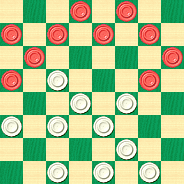
WHITE
White to Play and Win
W:W32,31,30,27,23,22,21,19,18,14:B16,13,12,9,8,7,6,5,3,2.
Bombard this position with your best ideas and see if you can find the White win. As we pointed out above, there are some subtleties here that we discovered with computer analysis, so you may find this an explosive problem, but take a shot and then click on Read More to see the solution.![]()
Summer Speedster
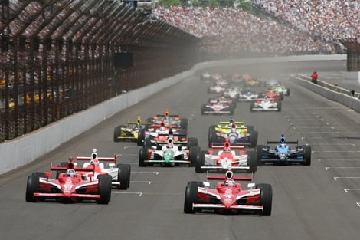
Does it seem like summer speeds in and just as quickly speeds out? It's already August, arguably the hottest month in most of the Northern Hemisphere, but September lies just around the corner, bringing with it the fall season.
But we'd like you to stay in gear for a few moments and contemplate this month's speed problem. It's from actual play in a game won by on-line checkerist Chris T. from Wales in the United Kingdom. The problem is not terribly hard but requires keen "checker vision," something Chris T. seems to have in spades.
We'll be generous and give you 15 seconds to solve it. When you're ready, click on the link below to display the problem and start the clock. After you've speedily found the solution, click on Read More to check your work.
August Speed Problem (moderate difficulty - 15 seconds)
![]()
